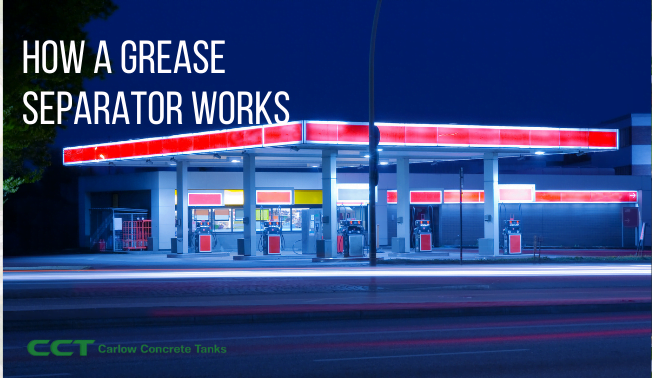Did you know that wastewater systems can be negatively impacted by oil and grease? These contaminants can cause serious problems for businesses and municipalities, leading to expensive repairs and environmental damage. Commonly installed in commercial and industrial environments, a grease separator is a plumbing device designed to filter out oil and grease from wastewater before it enters the sewer system. In this article, we will discuss how a grease separator works and how they can help maintain healthy wastewater systems!
What is a Grease Separator?
When oil, petrol and grease enter a water system they can cause problems, and can be harmful to the environment if they are not disposed of properly.
Oil and grease can float on the surface of water, leaving a layer of scum. A grease separator is a device used to remove hydrocarbons from water. It is designed to remove these contaminants from wastewater, causing less harm to the environment. By using a grease separator, you can ensure that your business is doing its part to protect the planet.
How do Grease Separators Work?
Grease separators work by using gravity to separate oil and grease from water. The oil and grease float to the top of the separator, while the water is able to flow through the bottom. The separated oil and grease are then collected in a chamber where they can be disposed of properly. This is achieved by silt fences or oil-water separators downstream of the grease separator.
What are the benefits?
Let’s look at some of the benefits of using a grease separator:
– Prevents oil and grease from entering the environment, which can be harmful to aquatic life
– Reduces the amount of sludge that needs to be disposed of
– Helps maintain a healthy wastewater treatment system by removing contaminants like oil and grease
What are the different types of Grease Separators?
Forecourt Separator: Forecourt separators have become an essential piece of equipment in forecourt environments. They serve to protect both the environment and the health and safety of those working in or visiting these areas. Forecourt separators are most commonly found in petrol forecourts, refueling plants, and fuel storage facilities.
Full Retention Separator: Full retention separators are an important part of wastewater management, serving to remove pollutants and contaminants from the water before it can cause harm to the environment. They are often used in high-risk areas such as roadways, fuel depots and car parks where they can treat the full flow of surface water and prevent oil and silt build-up.
Bypass Separator: Bypass separators are a functional and cost-effective solution for low-risk flood areas. They are designed to treat lightly contaminated environments and low-risk flood areas. A bypass separator can be installed to treat surface car parks, roadways, and commercial areas that have been affected by mild contamination.
Washdown Separator: Washdown separators can be used in a range of facilities, including vehicle wash down areas and pressure wash environments. Their core function is the removal of silt from wastewater systems and they are typically located in environments such as vehicle wash down amenities, tool hire depots and vehicle and farm equipment dealerships.
Silt Trap: Typically installed upstream of a soakaway, a silt trap collects and stores contaminated materials so that they cannot enter and damage the soakaway or sewer system. The filtered water can then flow through the water storage system. This is an important component in keeping your drainage system functioning properly and protecting it from damage.
Grease Trap: Grease traps are essential for food service establishments and can be installed to treat private drains, public sewer systems, pumping facilities and treatment plants. Fats, oils and grease (FOG) can cause serious problems when released into a sewer system or drainage facility. Wastewater containing FOG enters and flows through a grease trap before entering a draining system. This essential piece of equipment intercepts FOG while allowing filtered water to be released, reducing the risk of contaminants being released into external wastewater systems.
Some of the factors you need to consider when choosing a grease separator include:
– The type of oil and grease you need to remove
– The flow rate of your system
– The size of your system
– The level of oil and grease in your wastewater
– The environmental conditions of your area
Oil, petrol and grease separators are a necessary part of keeping our environment clean, and should be considered for any application where wastewater is produced. At Carlow Tanks we have a wide selection of Separators to suit different environmental and domestic needs, and we can help you select the correct separator type for your specific drainage requirements.
Get in touch with us today or give us a call at +353 (0) 59 9159100 for your free quote.

